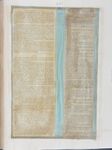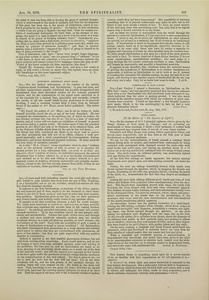Anonymous Assertions about Magic
Sir,—For the further information of the readers of the article, “Opinions about Occultism and Spiritualism,” in your last issue, and all other truth seekers equally interested but possibly disappointed and intimidated from their cherished studies by the extracts presented therein, and for the confirmation of the grand truth embodied in it of the necessity for a natural bias, physically and mentally, towards the occult, in all who would attain to any proficiency in its practical working, I send a verbatim extract from a letter from an intimate friend of the author of Art Magic, never before published. The writer says:—
“My friend, the author of Art Magic, can do all he writes of, make himself invisible, travel the air, or any of the feats described. He can command the elementaries, or do anything else of which he writes; he has Hindoo servants who can also do so; but he is a man of rank and station, and of course will not make an exhibition of himself, or parade his powers before a gaping world. He insists upon it that the practical powers of Art Magic are only to be obtained, as he obtained them, and as the Fakeers of India obtain them by the arts he has laid down. ..... My friend has fully convinced me there is no royal road to power, and that invocations and talk are of no effect, without a body prepared physically, and a mind concentrated by contemplation, fasting, abstinence, and severe mental and physical exercises. In these methods the true virtue of initiation consists.”
As to this “M. A. (Oxon.)” seems conclusive when he says “nothing short of the severest exercise of will, so severe as to paralyse the mental powers for a long subsequent time, can avail to produce any objective effect”—unless, of course, the individual possesses the natural hereditary bias I before referred to, or is so favourably circumstanced and situated as to be able and willing to subject himself to a preparatory course of training, obviously undesirable and probably unsatisfactory, except to the few who already possess from birth, if they do not cultivate or exercise, those psychical germs.
Occultism
Sir,—I have read with exceeding interest the most able and admirable article in your number this week from the pen of Mrs. Hardinge. I, as a Spiritualist, not as yet an occultist, cannot but endorse all that her eloquent language narrates.
It appears to me that Spiritualists, as students of the divine nature, the non-material part of man, ought to be the foremost to enrol themselves in the list of those anxious and eager to solve that most momentous problem. Spiritualism gives us the key; but we have unlearned and clumsy hands, and nothing really comes of our ignorant efforts.
It appears to me that occultism presents a field for occult inquiry. We ought most anxiously to explore it; and is it not, at least, possible that occultism may represent the ancient form of the coming modern science? As astrology preceded astronomy, may not some new science succeed occultism? In its day occultism served its own purpose sufficiently and satisfactorily. Science has made strides since, and through a modern and more positively scientific method, may not ancient occultism develop in a new and glorious, possibly an exact science—the real science of the soul? Even with the possibility of such a result, is it wise of Spiritualists to assail or ignore occultism? All Spiritualists who have investigated their phenomena in a truly earnest and truthful spirit agree in stating that they are overburdened with phenomena, all more or less similar; but they are quite unprovided with any positive theories in consequence.
Indeed, it appears to me that truthful phenomena increase, but not with them corresponding knowledge. Facts crowd upon us, and we are all longing to begin even some scientific method, some real solving of the problems; but time goes by, and we Spiritualists are much as we were, glorying in our knowledge which raises us so much out of the dust of the material world; and still the earnest ones amongst us feel beaten to the dust again under the greatness of our knowledge and the smallness of our comprehension of this vast subject. The key is given to us; we try to turn the lock; but the door will not open. Let us try what occultism will do, and the first gleams of the sunshine through the parting doors will soon inspirit us all. My belief is, the doors will open. Such knowledge is not too great for man; if it were we should never even have had the reviving mental glimpses we most of us have had. Had the sages of old been told of the wonderful results of modern science, would they not have been scared? The possibility of knowing something that is at present unknowable may scare us now, but in the future it may seem simply a matter of fact. To have an exact science of the soul may seem very astonishing now; but, still, that is no logical reason why it should astonish us in the future.
Let us chase the demon of materialism from the world through the advent of a material Spiritualism, if I can express it in such contradictory terms. I mean to say, let us prove our Spiritualism as other sciences are proved, not always in a material, but at all events in an intellectual sense. If Spiritualism is never to be grasped through the reason, it will always remain much as it is—mysterious, unproved doctrine, to be believed in by some only, those who have by nature a capacity for judging and reasoning of events by other faculties than the common ones. To these people Spiritualism is and must be a truth of the most glorious and noble a kind. To others, deprived of these divine faculties (I do not mean commonplace, unintellectual credulity), who must judge of a thing through the five senses commonly ascribed to man, Spiritualism will remain an unprovable, and possibly a fraudulent assertion.
It appears to me, therefore, that occultism being the material means of proving the hypothesis of Spiritualism to be neither fraudulent nor unprovable, it behoves us Spiritualists to set to work to see if, instead of scouting the venerable but obsolete science, we may not take it to our hearts, and develop it into another region of intellectual life for our own and every one’s sake. Only let us know how to set to work.
Modern Belief
...
Editor's notes
- ↑ Anonymous Assertions about Magic by unknown author (signed as One of the Five Hundred), London Spiritualist, No. 314, August 30, 1878, p. 107
- ↑ Occultism by unknown author (signed as de S, I.), London Spiritualist, No. 314, August 30, 1878, p. 107
- ↑ Modern Belief by unknown author, Religious Intelligencer, The, Saint John, September 20, 1878
Sources
-
London Spiritualist, No. 314, August 30, 1878, p. 107


